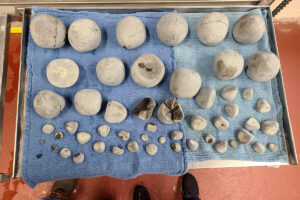New Treatment for Endotoxemia
Michelle Henry Barton, DVM, PhD, of the University of Georgia, recently completed a project on treating endotoxemia with polymyxin B (PMB), an alternative to endotoxin antibody products. The drug PMB kills many Gram-negative bacteria and also binds endotoxin, preventing interaction of endotoxin with white blood cells (WBC) as do endotoxin antibody products–thus heading off the damaging
- Topics: Article
Michelle Henry Barton, DVM, PhD, of the University of Georgia, recently completed a project on treating endotoxemia with polymyxin B (PMB), an alternative to endotoxin antibody products. The drug PMB kills many Gram-negative bacteria and also binds endotoxin, preventing interaction of endotoxin with white blood cells (WBC) as do endotoxin antibody products–thus heading off the damaging effects created by that reaction.
“The expense, adverse reactions, and occasional failures (of endotoxin antisera) have directed our attention toward the use of PMB instead,” she says.
Gram-negative bacteria in the horse’s hindgut help break down fibrous feeds. Endotoxemia occurs when toxins from Gram-negative bacteria get out of the intestine and into the bloodstream. (Endotoxin originates from the outer cell membrane of bacteria.) The intestinal lining usually provides a safe barrier to the rest of the body, but if the integrity of the gut wall is compromised, endotoxins can enter the bloodstream. When the immune system overreacts to the toxins, the result is endotoxemia. Endotoxin becomes concentrated on the surface of WBC, causing them to secrete inflammatory agents. Massive release of these agents cause the horse to go into shock.
Once the process begins, it can be difficult to reverse it and save the horse. Halting further production of inflammatory agents could make the difference in whether the horse can recover. “Even when used hours after the onset of endotoxemia, PMB reduces synthesis of damaging chemicals and improves survival rates,” says Barton. “The affordability and ease of administration of PMB provide considerable promise for its clinical use
Create a free account with TheHorse.com to view this content.
TheHorse.com is home to thousands of free articles about horse health care. In order to access some of our exclusive free content, you must be signed into TheHorse.com.
Start your free account today!
Already have an account?
and continue reading.

Related Articles
Stay on top of the most recent Horse Health news with

















